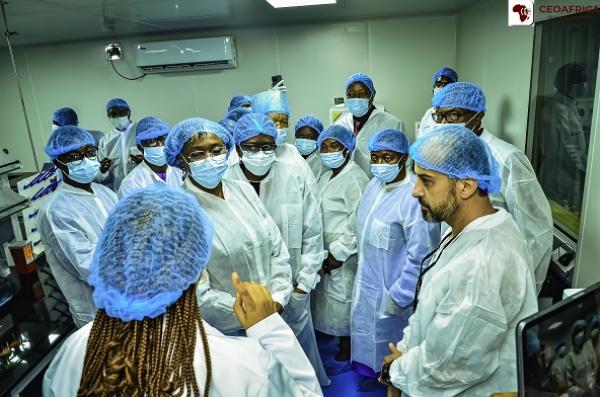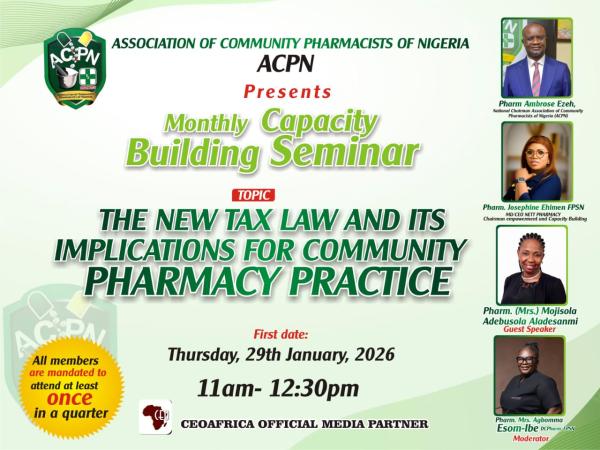
Over the recently commissioned Good Manufacturing Practices (GMP) facility reported by CEOAFRICA at the Faculty of Pharmacy, University of Lagos, drug companies in Nigeria have been charged to have their own facility.
The National Chairman of the Association of Industrial Pharmacists of Nigeria (NAIP), Pharm. Kenneth Onuegbu, challenged drug companies while co-hosting a panel discussion on academia/industrial collaboration set up by the Department of Pharmaceutics and Pharmaceutical Technology of the University of Lagos on Tuesday, May 28, 2024.
The discussion panel consisted of the Executive Director of Emzor Pharmaceutical Group, Pharm. Uzoma Ezeoke; Prof. Gbolagade Silva of the Department of Pharmaceutics and Pharmaceutical Technology; Engr. Fuzio Alkelani of Fab Technologies; and Ray Rubio of MedAfrica Foundation, who joined online via Zoom.
Organized as part of the event marking the commissioning of MedAfrica GMP lab facility, the theme for the panel discussion was “Academia/Industry Collaboration: A Case for Purpose-Driven Research through Product Development in Line with cGMP Specifications.”
The Acting Head of Department of Pharmaceutics and Pharmaceutical Technology at UNILAG, Dr. Margaret Ilomuanya, achieved the establishment of the GMP Facility built by MedAfrica Foundation which the NAIP had wanted for years. While doubling as the lead discussant and co-host with Dr. Arinola Jordan of the Department of Pharmaceutics, Onuegbu said the GMP lab facility that NAIP had been working to have in a decade was what materialized under the hands of Dr. Ilomuanya.
“What you have here is what NAIP has been looking for. At NAIP, we saw this coming. About 8 years ago, NAIP was the first technical arm of PSN to institute a special research grant with the Nigeria Association of Pharmacists in the Academia (NAPA). And the whole aim was to drive the vision you are seeing today; to galvanize research that will propel industry growth,” Onuegbu stated.
According to Onuegbu, part of the giant strides that NAPA in conjunction with NAIP achieved to realize the dream of the GMP lab dream was the conferment of awards on two research fellows from UNILAG – Dr. Margaret Ilomuanya and Dr. Paul Chukwuemeka, adding that Nigeria can transform into a production economy if industrialists would engage in research and production with tertiary institutions.
“For us at NAIP, we believe that the only way we can come out of this quagmire is through research, industrialization, and academia/industry collaborations. That’s why we started the journey a long time ago; what happened during the COVID-19 pandemic was quite an eye-opener for us,” the NAIP national chairman told attendees.
Onuegbu also lamented that there is a huge gap in the pharmaceutical industry that only another GMP facility can fill, noting that constructing a replica of MedAfrica GMP lab in another part of the country would go a long way to help the pharma industry and propel economic growth.
He declared that going to NAFDAC for product analysis is not enough for the pharma industry in Nigeria, stating that, “So, the question here today is: Can local pharmaceutical giants in Nigeria pull resources together to raise funding for another GMP lab in any part of the country?”
The founder of Tricare Pharma Nigeria Ltd. and MD/CEO of Xential Pharmaceuticals Nigeria Ltd. recalled that not too long ago, five professional bodies came together to establish the Federation of Nigerian Pharmaceutical Industries Association (FENPIA). The umbrella body would collate the challenges faced by entrepreneurs in the pharmaceutical industry and forward them to experts in the academia for solutions.
“We can do this as a group or start looking for experts that can write projects that will land us another beautiful grant for a GMP lab facility like Dr. Margaret did. We need to start building what Emzor is doing – having at least 2-3 API manufacturing plants in the country. We need to reverse this trend of 70% importation and 30% local production. We can build more industries and encourage local contract manufacturing so that those who do not have what it takes to build a $5 million factory can have the same opportunity that the big pharma companies have,” he said.






















